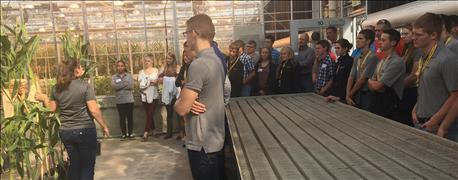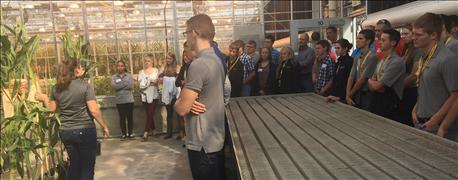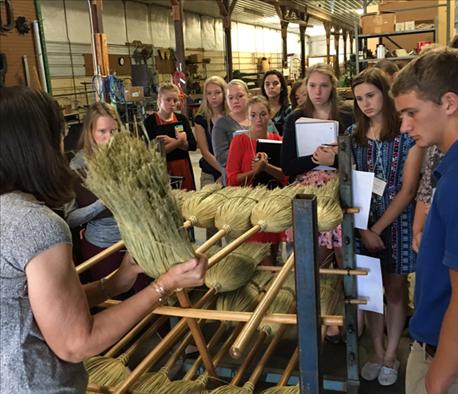
Ten years ago, a film student at Effingham High School visited a local entrepreneur, videoing him for a project. The student learned a lot, came back to school and told his teacher, “Every kid should have the opportunity to do what I did today! I learned more in 45 minutes than in all of high school.”
His teacher agreed. In three days, the teacher raised $50,000 from the community, and the CEO Program was born. In short, 23 high school upperclassmen are chosen each school year to participate in daily classes, learning from business leaders in their community and ultimately creating their own business.

FIELD TRIP: The Jasper County CEO Program recently took its group to Beck's in Atlanta, Ind., to learn firsthand how the seed company operates.
Today, the program is administered by the Midland Institute for Entrepreneurship, and it’s grown to 35 communities across four states, says Amy Tarr, national community director at the institute. Tarr, a Jasper County native, says each program is governed by a board of directors made up of their own community members and educators, and all funding comes from private dollars in the community. Programs exist in Illinois, Indiana, Minnesota and Colorado.
Students meet five days a week throughout the school year. They either go out into the community to meet with business leaders, or the experts come to them. In Jasper County, Tarr says the class meets from 7:15 to 8:45 a.m. every day, and students are expected to wear business attire. They earn 2 high school credit hours, and in some cases qualify for dual credit with local community colleges. In the fall, they organize a business event — often dinner and entertainment — and in the spring, they launch their own business.

CREATE: Jasper County CEO Program students hear from community leaders on a regular basis, learning accounting, marketing, production and more.
At the end of the school year, students present their product or service at a trade show, and as Tarr says, “It can’t look like a science fair! It has to look like a professional trade show — draping and displays and everything. They have to display the product in a professional manner with packaging and shipping and everything.”
Students have created everything from gymnastics and basketball lessons to closet organization services, honey products, T-shirts, goat soaps and lotions, and even a company that buys and resells rodeo clothing.
Pay off?
“These kids are 10 to 15 years ahead of their peers,” Tarr says. “And now, the kids that have been through the program and are out of college and working for people? They are the most valuable people in the company.”
She says the CEO Program is community development in disguise. The program lets students see how a community works, how businesses work, who works with whom, and how they make it happen. They see opportunities in their small towns where before, they may have only seen a place they wanted to leave.
“We’re planting seeds for economic development,” Tarr adds. “By making these kids more aware of the community and the opportunities that exist, we hope they go to college and take in other concepts and maybe even work in other communities; but then, we hope the end result is they come home and start businesses or become intrapreneurs in businesses that already exist.”
Indeed, when students are surveyed before and after the program, asking whether they see a future living and working in their hometown, the numbers are startling. Tarr says in one program in Minnesota, prior to going through the program, just 12% of the CEO Program students said they saw opportunity in their hometown. After the program, 72% could see opportunity.
For more information, check out midlandinstitute.com.
About the Author(s)
You May Also Like






